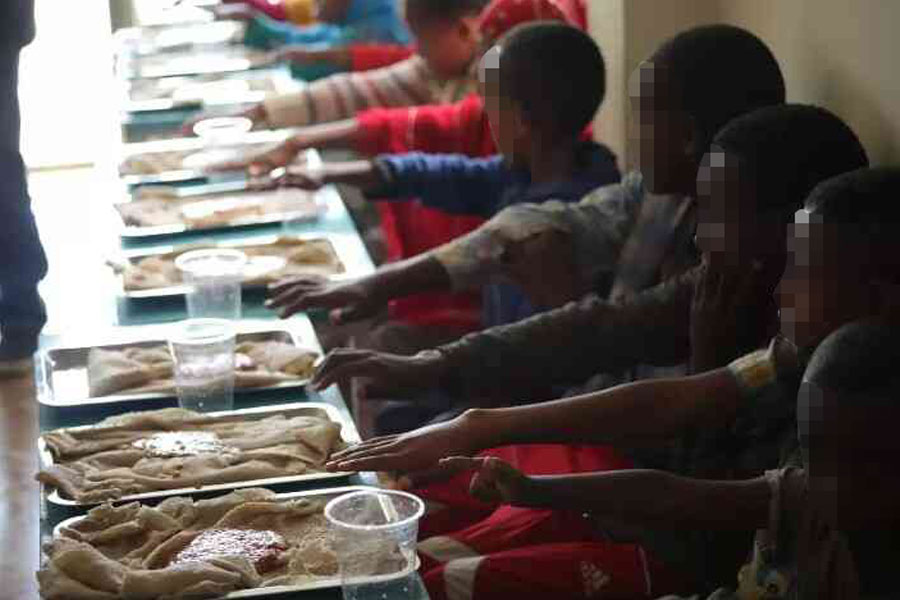
My Opinion | Dec 05,2018
Jul 22 , 2023
By Chimimba David Phiri (PhD) , Sara Mbago-Bhunu and Menghestab Haile
The call to action is clear: a concerted, holistic effort is necessary to invest in implementing sustainable climate-resilient and nutrition-sensitive agri-food systems, to address malnutrition, and to build a healthier, more secure future for the African continent, argue Chimimba David Phiri, FAO`s sub-regional coordinator & representative to the AUC and UNECA; Sara Mbago-Bhunu, IFAD regional director for East & Southern Africa; and Menghestab Haile, WFP`s regional director for Southern Africa.
As the continent of Africa battles a burgeoning hunger crisis, the universally agreed-upon Sustainable Development Goals appear more mirages than milestones. These goals, which ambitiously outline the eradication of hunger, bolstering food security and nutrition, and promoting sustainable agriculture, seem to be slipping further from reach.
For the three years beginning 2019, the African continent saw an alarming spike in undernourishment, with figures ballooning by 60 million to a staggering 282 million individuals, according to the latest UN report on the 'State of Food Security & Nutrition in the World.' This debilitating malnourishment translates into a worrying growth in stunting among children under five years old, affecting 59 million children—a number higher than seen two decades prior.
Africa, tellingly, is the sole region recording an escalating trend in stunting.
Poverty remains a potent scourge. More than 430 million Africans, mostly populating rural areas, endure a grim existence defined by extreme poverty. For a sobering 80pc of the population, a healthy diet is an unaffordable luxury. The precipitous and volatile hike in food prices, exacerbated by climate change, the lingering effects of Covid-19, and the disruptive war in Ukraine, compounds the chronic hunger and malnutrition endured by many.
The ramifications of this widespread malnutrition are not confined to the realm of public health. They bleed into economic domains, straining national resources with inflated healthcare costs, stunting education outcomes, and curbing productivity. The 'Cost of Hunger in Africa 2022 Report' highlights that between seven per cent and 16pc of repetitions in school is associated with stunting; stunted children register 0.2 to 1.2 years less in educational attainment.
As measured by GDP, the annual economic impact of child malnutrition – specifically underweight and stunting – hovers between three per cent and 16pc.
In lockstep with the escalating malnutrition, the estimated nutrition-specific financing needs have also climbed, rising from seven billion dollars a year to nearly 11 billion dollars for the period between 2022–2030, a total amounting to an estimated 97 billion dollars.
As these realities become starkly evident, the clarion call to invest in nutrition has become more urgent. Nutrition, a linchpin for progress in health, education, employment, women empowerment, and poverty reduction, has the potential to mould societies that are peaceful, secure and stable. However, current investments fall woefully short of the sheer scale of the nutrition crisis.
A disheartening case in point is the 2020 Global Nutrition Report, which highlights that among 48 low-income countries, average government spending on 'nutritional deficiencies' is a mere 1.87 dollars per person, marking the lowest expenditure for any disease category tracked.
Substantive strides against malnutrition necessitate intentional and sustainable investments in nutrition and nutrition-sensitive agri-food systems. The potential return on investment is considerable. Every dollar invested in nutrition can generate 16 dollars in return, and a reduction in malnutrition could potentially lift national economic productivity by 11pc as measured by GDP per capita.
For 15 African countries, meeting the 2025 World Health Assembly target for stunting would add 83 billion dollars to national incomes.
In response to the years of underinvestment that have precipitated slow and uneven progress against malnutrition, United Nations agencies and development partners have redoubled their efforts to drive, promote and create awareness about nutrition financing. Notably, the '2022 African Union Year on Nutrition' has reinforced political commitments and heightened awareness around the need to tackle malnutrition in all its forms.
In December 2022, African leaders lent their support to the Abidjan Declaration, which champions ‘accelerated investment, implementation, and coordination to improve nutrition and food security in Africa.’ Further commitments to increased funding for nutrition were made at the 'High-level Conference on Nutrition Financing' hosted by King Letsie III in Maseru.
The Africa Food Summit in Dakar endorsed the 'Country Food & Agriculture Delivery Compacts' to fast-track the implementation of the African Union’s Comprehensive Africa Agriculture Development Programme (CAADP), and echoed calls for internal and external financing from a broad spectrum of bilateral and multilateral partners, and the private sector.
Crucially, the need for a collective effort in which diverse stakeholders each play their part in driving this agenda has been recognised. Countries and international organisations must continue to prioritise nutrition in development finance and honour commitments made at global conferences such as the first and second international conferences on Nutrition, the First International Conference on Food Safety, the UN Food Systems Summit, and the Nutrition for Growth (N4G) Summit.
Countries bearing the high burden of malnutrition must work towards increasing the share of their national budgets earmarked for nutrition, while simultaneously seeking fresh mechanisms to incorporate nutrition within national programmes. Additionally, investments in natural resources, agriculture, food systems, trade and commerce should be made to enhance the availability, accessibility, affordability, and preparation and consumption of nutritious foods.
The private sector, too, has an important role to play in this endeavour.
In this critical mission, climate change adaptation and mitigation strategies must also consider the impact of climate change on nutrition and explicitly address nutrition in the climate financing agenda. The role of domestic financing in achieving lasting gains cannot be overstated, as can the responsibility of Members of Parliament (MPs) in securing adequate budgets for nutrition.
The search for innovative financing mechanisms to channel new resources and bridge the investment gap in nutrition is paramount, including through public-private partnerships, risk management tools, innovative credit tools, smart subsidies, migrant remittances, social bonds, climate-related financing, and diaspora investments. The private sector can further contribute by investing in the research and development of new nutritious products, introducing innovative technologies and supporting food fortification programmes to enhance nutrition outcomes.
It is key to address fragmented food markets and their propensity to favour unhealthy food options such as fast food and cheap processed foods. Providing incentives for food producers to prioritise the production and distribution of nutritious foods through subsidies, grants, and tax breaks can help make healthy options more affordable and accessible.
PUBLISHED ON
Jul 22,2023 [ VOL
24 , NO
1212]

My Opinion | Dec 05,2018

Radar | Jun 18,2022

View From Arada | Aug 03,2019

Viewpoints | Feb 12,2022

Commentaries | Dec 11,2021

View From Arada | Jan 07,2023

My Opinion | Oct 08,2022

My Opinion | Mar 01,2024

Sunday with Eden | Apr 08,2023


Photo Gallery | 179212 Views | May 06,2019

Photo Gallery | 169407 Views | Apr 26,2019

Photo Gallery | 160306 Views | Oct 06,2021

My Opinion | 137163 Views | Aug 14,2021
Commentaries | Oct 25,2025

Dec 22 , 2024 . By TIZITA SHEWAFERAW
Charged with transforming colossal state-owned enterprises into modern and competitiv...

Aug 18 , 2024 . By AKSAH ITALO
Although predictable Yonas Zerihun's job in the ride-hailing service is not immune to...

Jul 28 , 2024 . By TIZITA SHEWAFERAW
Unhabitual, perhaps too many, Samuel Gebreyohannes, 38, used to occasionally enjoy a couple of beers at breakfast. However, he recently swit...

Jul 13 , 2024 . By AKSAH ITALO
Investors who rely on tractors, trucks, and field vehicles for commuting, transporting commodities, and f...

Oct 25 , 2025
The regulatory machinery is on overdrive. In only two years, no fewer than 35 new pro...

Oct 18 , 2025
The political establishment, notably the ruling party and its top brass, has become p...

Oct 11 , 2025
Ladislas Farago, a roving Associated Press (AP) correspondent, arrived in Ethiopia in...

Oct 4 , 2025
Eyob Tekalegn (PhD) had been in the Governor's chair for only weeks when, on Septembe...

Oct 25 , 2025 . By YITBAREK GETACHEW
Officials of the Addis Abeba's Education Bureau have embarked on an ambitious experim...

Oct 26 , 2025 . By YITBAREK GETACHEW
The federal government is making a landmark shift in its investment incentive regime...

Oct 29 , 2025 . By NAHOM AYELE
The National Bank of Ethiopia (NBE) is preparing to issue a directive that will funda...

Oct 26 , 2025 . By SURAFEL MULUGETA
A community of booksellers shadowing the Ethiopian National Theatre has been jolted b...